Global Impact of Siberian Wildfires on Air Quality & Climate
Modeling Broader Effects of Wildfires in Siberia
Tags: Hokkaido University, Japan, Computing Technology, Energy & Environment
Researchers from Hokkaido University, the University of Tokyo, and Kyushu University have modeled the global impacts of increasing wildfires in Siberia, revealing significant effects on air quality, climate, health, and economies. Using global climate models such as MIROC5 and aerosol model SPRINTARS, they found that wildfire emissions cause cooling in the northern hemisphere due to aerosol reflection of sunlight. These aerosols degrade air quality, leading to premature mortality and economic losses in East Asia and beyond. The study estimates that extreme wildfire scenarios could cause health-related costs up to $10 billion annually. Efforts to mitigate these effects are critical to limit further health and economic damage.
IP Type or Form Factor: Discovery & Research; Software & Algorithm
TRL: 2 - technology concept and/or application formulated
Industry or Tech Area: Big Data Analytics & Simulations; Environment & Sustainability






